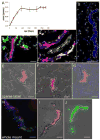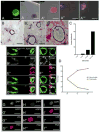In vivo clonal analysis reveals lineage-restricted progenitor characteristics in mammalian kidney development, maintenance, and regeneration
- PMID: 24835991
- PMCID: PMC4425291
- DOI: 10.1016/j.celrep.2014.04.018
In vivo clonal analysis reveals lineage-restricted progenitor characteristics in mammalian kidney development, maintenance, and regeneration
Abstract
The mechanism and magnitude by which the mammalian kidney generates and maintains its proximal tubules, distal tubules, and collecting ducts remain controversial. Here, we use long-term in vivo genetic lineage tracing and clonal analysis of individual cells from kidneys undergoing development, maintenance, and regeneration. We show that the adult mammalian kidney undergoes continuous tubulogenesis via expansions of fate-restricted clones. Kidneys recovering from damage undergo tubulogenesis through expansions of clones with segment-specific borders, and renal spheres developing in vitro from individual cells maintain distinct, segment-specific fates. Analysis of mice derived by transfer of color-marked embryonic stem cells (ESCs) into uncolored blastocysts demonstrates that nephrons are polyclonal, developing from expansions of singly fated clones. Finally, we show that adult renal clones are derived from Wnt-responsive precursors, and their tracing in vivo generates tubules that are segment specific. Collectively, these analyses demonstrate that fate-restricted precursors functioning as unipotent progenitors continuously maintain and self-preserve the mouse kidney throughout life.
Copyright © 2014 The Authors. Published by Elsevier Inc. All rights reserved.
Conflict of interest statement
The authors declare no competing financial interests.
Figures






References
Publication types
MeSH terms
Grants and funding
LinkOut - more resources
Full Text Sources
Other Literature Sources
Molecular Biology Databases

